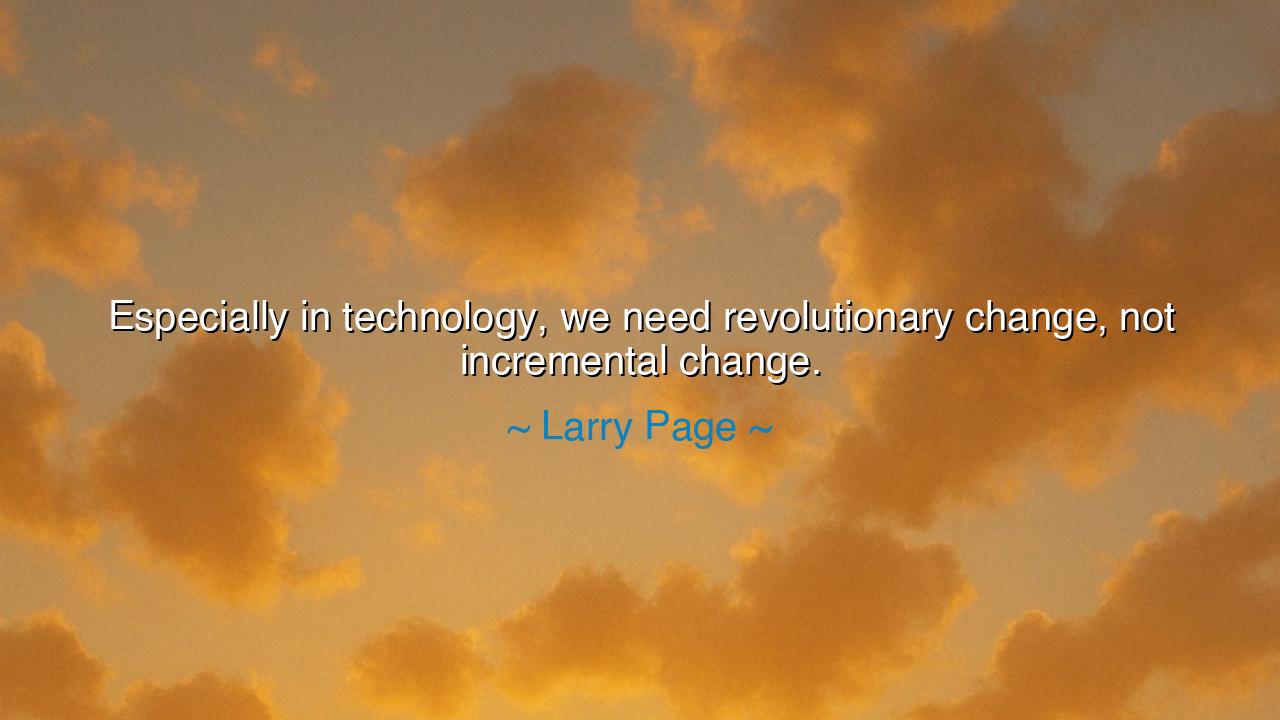
Especially in technology, we need revolutionary change, not






Larry Page once proclaimed with vision and urgency: “Especially in technology, we need revolutionary change, not incremental change.” In this statement, he strikes the heart of progress itself. For in the realm of technology, where the tools of tomorrow shape the destiny of nations, small steps are not enough. The age demands revolutions, leaps so vast that they alter the very fabric of human life. Page’s words are a call to abandon timid adjustments and instead embrace bold transformations, daring enough to reshape the world.
The origin of these words lies in Page’s role as co-founder of Google, a company that did not merely improve search—it redefined knowledge itself, making information accessible to every soul with a connection to the digital web. He saw that the future is not secured by minor adjustments, but by moonshots, the pursuit of ideas that appear impossible until they are achieved. From self-driving cars to artificial intelligence, his philosophy has always been to look not at the next step, but at the next horizon.
History, too, confirms the power of revolution over incrementalism. Consider the Industrial Revolution. If inventors had contented themselves with slightly better hand tools or marginally faster horses, the world would have lingered in centuries of slow change. But with the harnessing of steam, the invention of engines, and the mechanization of labor, humanity leapt forward. Lives were transformed, cities were built, empires rose—all because people dared to abandon the safety of the familiar and embrace the unknown power of radical change.
Page’s wisdom also reminds us of the danger of clinging to the comfortable. Incremental change lulls the heart, giving the illusion of progress while the world races past. Revolutionary change, by contrast, unsettles, frightens, and challenges, but it is this very discomfort that births greatness. The airplane was not an incremental improvement upon the horse-drawn carriage—it was a revolution. The internet was not an incremental advance over the postal system—it was a revolution. Such is the path that Page calls us to walk.
Yet we must also see the paradox. Revolutionary change is not chaos without vision; it is guided daring. It requires both courage and discipline, both dreaming and relentless work. Those who chase revolution without patience are fools, but those who cling to patience without daring are cowards. The wisdom lies in balance: to dream at a scale that terrifies, and to labor with the discipline that brings those dreams into being.
The story of Thomas Edison illustrates this truth. He did not merely improve upon the candle—he created the electric light. His invention was not a step forward but a leap into a new age, and it reshaped human life. Night no longer ended work or learning; cities became radiant even in darkness. This is the spirit Page calls for: to imagine not what can be slightly better, but what can be entirely different.
The lesson for us, O seekers of wisdom, is that in your own lives, do not be content with small changes when great ones are possible. If you wish to create, do not ask, How can I make this a little better? Ask instead, How can I make this entirely new? In your craft, your vision, your community—dare to think in revolutions, not in increments.
Thus, let Larry Page’s words echo across generations: progress is not the child of hesitation, but of boldness. Especially in technology, where the pace of life accelerates with each heartbeat, it is the daring, the dreamers, the builders of revolutions who will carve the path forward. Embrace the terrifying leap, and by it, change the world.






AAdministratorAdministrator
Welcome, honored guests. Please leave a comment, we will respond soon